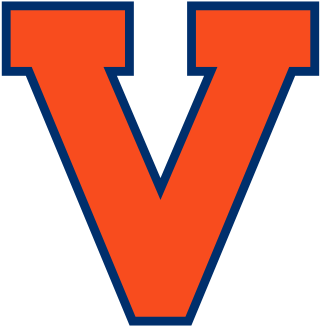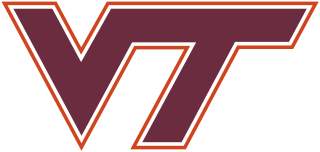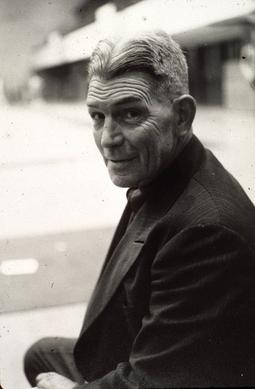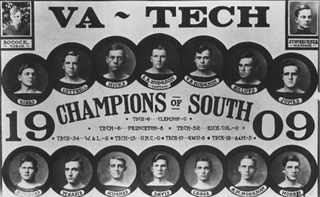Music


"Tech Triumph" is the fight song of Virginia Tech. It was composed in 1919 by Wilfred Pete Maddux (class of 1920) and Mattie Eppes (Boggs). [1] [2]
The song is noted for beginning with the opening notes of Reveille — a nod to Tech's past as an all-male military school.
Wilfred Preston ("Pete") Maddux, a trombone and baritone player in the Virginia Tech Regimental Band (member of the band from the Fall of 1917 to 1919), jointly composed "Tech Triumph" in 1919 along with Mattie Walton Eppes (Boggs). Mattie Eppes was a neighbor of Pete in his hometown of Blackstone, Virginia. When he was home, Pete would often play violin with Mattie accompanying him on the piano. One evening in the summer of 1919, Pete asked her to help him compose a fight song for VPI. She played the tune and Pete wrote out the score and the words for two verses in a single evening. Pete Maddux is not listed in the yearbook with the band after 1919. Miss Eppes later married John C. Boggs, Superintendent of Randolph-Macon Military Academy. [3]
Techmen, we're Techmen, with spirit true and faithful,
Backing up our teams with hopes undying;
Techmen, Oh, Techmen, we're out to win today,
Showing pep and life with which we're trying;
V.P., old V.P., you know our hearts are with you
In our luck which never seems to die;
Win or lose, we'll greet you with a glad returning,
You're the pride of V.P.I.
Chorus:
Just watch our men so big and active
Support the Orange and Maroon. Let's go Techs.
We know our ends and backs are stronger,
With winning hopes, we fear defeat no longer.
To see our team plow through the line, boys.
Determined now to win or die:
So give a Hokie, Hokie, Hokie, Hi,
Rae, Ri, old V.P.I.
Second Verse, seldom used:
Fight, men, oh, fight, men, we're going to be the champions
Adding to our list another victory;
Football or baseball, the games in which we star,
They're the sports which made old VP famous.
Hold'em, just hold'em, you know the Corps' behind you
Watching every movement that you make.
Winning games was nothing for our teams before you --
Keep the "rep" for VP's sake. [4]


The song was first performed on Saturday, November 1, 1919, before the football game between V.P.I. and Washington and Lee University. The issue of the university newspaper noted:
On arriving at the grounds, the battalion was formed for the review on the football field. After passing in review before the grandstand, the four companies formed a hollow square with the band in the center, and the band played our new song, 'Tech Triumph'.
— Nov. 5, 1919, The Virginia Tech
In a letter to The Virginia Tech published on Dec. 10, 1919, Maddux expressed his appreciation to the student body.
A strain of the Bliss Triumph potato developed for its disease resistance by Virginia Tech researchers in 1926 and was named Tech Triumph. [5]

The Virginia–Virginia Tech football rivalry is an American college football rivalry between the Virginia Cavaliers football team of the University of Virginia and Virginia Tech Hokies football team of Virginia Polytechnic Institute and State University. The two schools first met in 1895 and have played annually since 1970. The game counts for 1 point in the Commonwealth Clash each year, and is part of the greater Virginia–Virginia Tech rivalry.

The HokieBird is the official mascot of Virginia Polytechnic Institute and State University in Blacksburg, Virginia.

Lane Stadium is a college football stadium in the eastern United States, located on the campus of Virginia Polytechnic Institute and State University in Blacksburg, Virginia. The playing surface of the stadium is named Worsham Field. The home field of the Virginia Tech Hokies of the Atlantic Coast Conference (ACC), it was rated the number one home field advantage in all of college football in 2005 by Rivals.com. In 2007, it was ranked #2 on ESPN.com's "Top 10 Scariest Places To Play." The stadium is named for Edward Hudson Lane, a former student, local businessman, and Virginia Tech booster, while the playing surface is named for Wes Worsham, a university donor and booster.
The Virginia Tech Regimental Band, also known as the Highty Tighties, VPI Cadet Band, or Band Company was established in 1893 as a military marching band unit in the Virginia Tech Corps of Cadets at Virginia Polytechnic Institute and State University. Virginia Tech also has had since 1974 a non-military marching band, The Marching Virginians.

The Virginia Tech Hokies are the athletic teams representing Virginia Tech in intercollegiate athletics. The Hokies participate in the NCAA's Division I Atlantic Coast Conference in 22 varsity sports. Virginia Tech's men's sports are football, basketball, baseball, cross country, golf, soccer, swimming and diving, tennis, indoor and outdoor track and field, and wrestling. Virginia Tech's women's sports are basketball, cross country, lacrosse, soccer, softball, swimming and diving, tennis, indoor and outdoor track and field, golf, and volleyball.
The main campus of Virginia Tech is located in Blacksburg, Virginia; the central campus is roughly bordered by Prices Fork Road to the northwest, Plantation Road to the west, Main Street to the east, and U.S. Route 460 bypass to the south, although it also has several thousand acres beyond the central campus. The Virginia Tech campus consists of 130 buildings on approximately 2,600 acres (11 km2). It was the site of the Draper's Meadow massacre in 1755 during the French and Indian War.

The Virginia Tech Hokies football team represents Virginia Polytechnic Institute and State University in the sport of American football. The Hokies compete in the Football Bowl Subdivision (FBS) of the National Collegiate Athletic Association (NCAA) and the Coastal Division of the Atlantic Coast Conference. They previously competed in the Big East. Their home games are played at Lane Stadium, located in Blacksburg, Virginia, with a seating capacity of over 65,000 fans. Lane Stadium is considered to be one of the loudest stadiums in the country, being voted number two in ESPN's 2007 "Top 20 Scariest Places to Play". It was also recognized in 2005 by Rivals.com as having the best home-field advantage in the country.

Henry Gorham Crisp was an American football, basketball, baseball and track coach and college athletics administrator. In spite of an accident when he was 13 years old that resulted in the loss of his right hand, Crisp went on to letter in football, basketball and track at both Hampden–Sydney College and Virginia Tech – then known primarily as VPI.

The Marching Virginians are one of the two collegiate marching bands at Virginia Tech. Because the Marching Virginians draw from the general student body, they are considerably larger than the Highty Tighties and have about 330 members. Despite offering no scholarships to band members, The Marching Virginians consist of students from every college and virtually every major within the university, as well as several graduate students.
The 1905 VPI football team represented the Virginia Polytechnic Institute in the 1905 college football season. Led by first-year head coach Sally Miles, the team went 9–1 and claims a Southern championship. The team had the most wins in a Virginia Tech season for many years to come, and defeated rival Virginia for the first time. Tech outscored its opponents 305 to 24. Hunter Carpenter scored 82 of those points.
The 1918 VPI Gobblers football team represented Virginia Polytechnic Institute, now known as Virginia Tech, in the 1918 college football season. The 1918 team went 7–0 and claims a South Atlantic Intercollegiate Athletic Association (SAIAA) championship. It is the only team in school history that finished the season with a perfect record.

The 1909 VPI football team represented the Virginia Agricultural and Mechanical College and Polytechnic Institute in the 1909 college football season. Led by first-year head coach Branch Bocock, the team went 6–1 and claims a Southern championship. Tech outscored its opponents 148 to 27. The starting lineup averaged 172 pounds. This is the first season the team was referred to in print as the "Gobblers", and it became the official nickname in 1912.
The 1922 VPI Gobblers football team represented Virginia Polytechnic Institute in the 1922 college football season. The team was led by their head coach B. C. Cubbage and finished with a record of eight wins, one loss and one tie (8–1–1).
The 1923 VPI Gobblers football team represented Virginia Polytechnic Institute in the 1923 college football season. The team was led by their head coach B. C. Cubbage and finished with a record of six wins and three losses (6–3).
The 1910 VPI football team represented Virginia Agricultural and Mechanical College and Polytechnic Institute in the 1910 college football season. The team was led by their head coach Branch Bocock and finished with a record of six wins and two losses (6–2).
The 1925 VPI Gobblers football team was an American football team that represented Virginia Polytechnic Institute as a member of the Southern Conference during the 1925 season. In its fifth season under head coach B. C. Cubbage, VPI compiled a 5–3–2 record, finished in tenth place in the Southern Conference, and was outscored by a total of 52 to 39. The team played its home games at Miles Field in Blacksburg, Virginia.
The 1939 VPI Gobblers football team represented Virginia Agricultural and Mechanical College and Polytechnic Institute in the 1939 college football season. The team was led by their head coach Henry Redd and finished with a record of four wins, five losses and one tie (4–5–1).

The 1954 VPI Gobblers football team represented Virginia Polytechnic Institute, now known as Virginia Tech, in the 1954 college football season. The team, coached by Frank Moseley, had an 8–0-1 record. The team was ranked 16th in the final Associated Press poll. Three major college football teams had perfect records in 1954, but the Gobblers only prevailed over one team with a winning record, fellow Southern Conference member Richmond, which was 5–4.

The 1961 Virginia Tech Gobblers football team, also known as the VPI Gobblers, was an American football team that represented the Virginia Polytechnic Institute as a member of the Southern Conference (SoCon) during the 1961 college football season. In their first year under head coach Jerry Claiborne, the Gobblers compiled a 4–5 record, finished seventh in the SoCon, and were outscored by a total of 112 to 93.